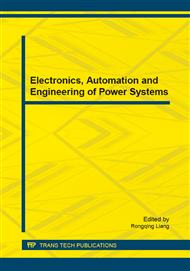p.906
p.910
p.916
p.921
p.925
p.930
p.935
p.941
p.947
Research on Power Quality Assessment Improvement of Marine Electric System
Abstract:
In order to enhance ships' security and stable energy efficiency,there are new challenges about the means on power quality assessment improvement of marine electric system. This paper analyzed the importance to the ship’s safety for quality of electricity,and discussed present situations about the question of poor power quality in marine electric system; moreover,especially proposed reasonable means on power quality assessment and more effective and practical means on improvement of marine electric system,through massive studies the experiment repeatedly using the mature control theory and computer simulation technology,as well as instance of three-phase harmonic filter for controlling harmonic distortion,based on the Matlab simulation software to establish the 12 pulse (AC - DC) converter simulation model; finally emphasized the future research directions and prospects of the electric utilization and marine engineering technology development.These important means may promote energy conservation and reliability enhancement to more deeply research on power quality assessment improvement of marine electric system.
Info:
Periodical:
Pages:
925-929
DOI:
Citation:
Online since:
February 2015
Authors:
Price:
Сopyright:
© 2015 Trans Tech Publications Ltd. All Rights Reserved
Share:
Citation:


